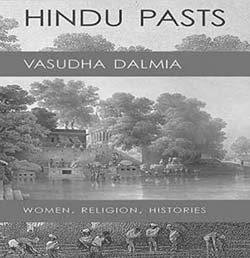In ‘Where these essays are coming from’, the introduction to this volume, Vasudha Dalmia retraces her intellectual formation and weaves the trajectory of her personal research interests with the political and cultural history of the last three decades. Intellectual autobiographies are all too rare, yet always riveting to read. Chance encounters that lead to unforeseen life paths (for her, landing in Germany as a 22-year-old), mixed family histories that surface later in life as questions demanding to be answered and reconciled (the stern Kashi of her widowed aunts, her mixed Marwari-Kayastha parentage with its different cultural and religious orientations), transcontinental professional moves that require adapting to new academic environments, and last but not least, political pressures that bring urgency and a deeper echo to one’s research interests, something all of us studying the history of modern Hindi nationalism in the age of Hindutva have felt.
The retrospective look of an intellectual autobiography discerns patterns and explores the unconscious motivations behind steps which must have felt sudden and bewildering at the time. Little of her upbringing in 1960s Delhi, as a student of English at Miranda House who had earlier been tutored at home in Sanskrit at her father’s behest and in largely premodern Hindi literature under the guidance of her mother (herself a budding Hindi poet in the 1930s), prepared her for life in Germany in the early 1970s. That layered, multilingual education, together with her later university training in German literature and classical Indology in Germany, opened doors into very different worlds, but these remained discrete worlds. Later in life, however, Dalmia brought them together and reassembled them in the distinct but overlapping trends of her scholarship: the making of Indology as a discipline, the continuities and changes in what Partha Chatterjee calls ‘our modernity’ between the earlier sampradayas and modern Hinduism, between older Hindi poetic tastes and the new Hindi print culture—embodied in the fantasmagoric figure of Bharatendu Harishchandra—, and between old and new understandings of, and spaces for, women; and the different strands that came together in the making of modern Indian theatre, Kashi and Banaras, India and Germany.
Reading these rich essays again and together in this collection, what is striking is the consistent application of a method, an exemplary and rigorous method that has made Dalmia such an admired scholar and teacher in India, Europe, and the US, and which allows her to speak with equal authority and interest to literary readers, intellectual, social and cultural historians, and students of religion and philosophy. Whether she is writing about German indologists, sati, or religious disputes, Dalmia always carefully sets up the historical and intellectual context, teases out the minute but all-important differences in genealogy and interpretation, mines texts for clues but also for innovations and texture, and connects textual elements to wider social and political forces and processes in order to reach compelling yet cautious conclusions. Raymond Williams surfaces regularly in the footnotes, as a trusted touchstone for how similar connections could be drawn within analogous processes in England.

